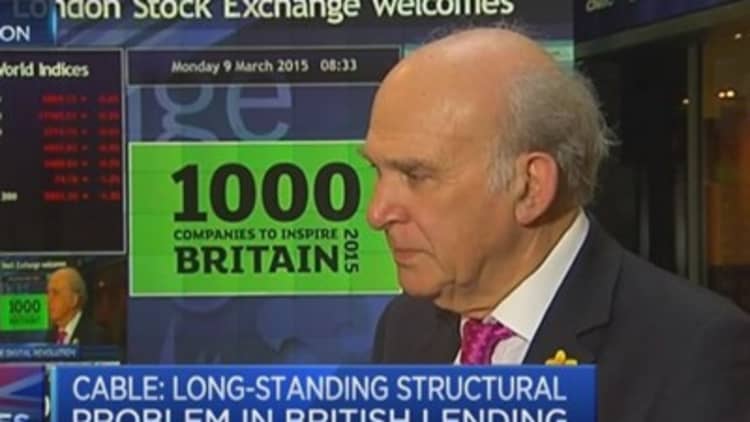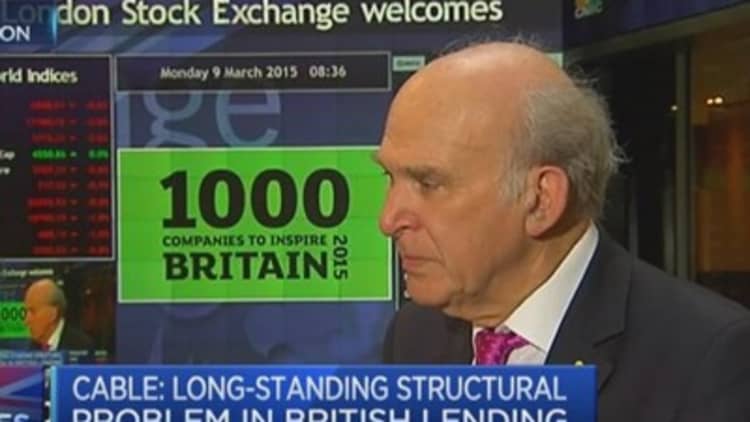
The long-standing problem in British lending is holding British businesses back but the tide is starting to turn, the U.K.'s Business Secretary, told CNBC Monday.
"There is a long-standing structural problem in British lending that it's usually been easier to raise money for property than it has been for companies and that is unfortunate," Vince Cable told CNBC.
"But I think that bias is something we're starting to correct," Cable added, noting that the development bank he set up three years ago, founded in order to increase the supply of credit to SMEs, was "proving critical" in supporting new firms.
According to the Federation of Small Businesses, as of 2014 there were an estimated 5.2 million small businesses in the U.K., employing 25.2 million people.
With a general election on the horizon in the U.K., in May, the business vote is keenly targeted by Britain's political parties, including the governing coalition made up of the Conservatives and Liberal Democrats, to whom Cable belongs, and the more left-wing Labour party.
Read MoreRead MoreWhy the UK's SMEsare shunning new markets
Speaking to CNBC from the London Stock Exchange, where the exchange was celebrating the success of 1,000 small and medium-sized businesses in the U.K., Cable called SMEs the "bedrock" of the U.K. economy and said they needed more support. "They're the people who determine whether we have a recovery or not," he said.
Showing that things are heading in the right direction, lending to SMEs rose 9 percent in 2014 from the previous year, according to the British Banking Association's latest data, with £29.2 billion of new SME borrowing approved in 2014.
Cable added that increased regulation in certain types of online fundraising for businesses, such as crowdfunding -- which raises money from a large number of people usually on the internet -- had also helped to decrease the risks for investors.
Read MoreCan the'Brittelstand' rival Germany?
"The last thing we want to do is create another bubble," he said, "(but) these days we're dealing with online technology and lending will increasingly take that form."
Sell-off controversy
Voters will also be looking at the government's business record including the rescue of the Royal Bank of Scotland and controversial privatization of the Royal Mail.
Last week, U.K. Chancellor George Osborne said he had made a mistake in not radically restructuring the partly-state owned Royal Bank of Scotland (RBS) after the government rescued the bank in 2010 and called for an early sale of the bank, as quickly as possible after the election.
Cable didn't agree that the rescue of RBS had been a failure, however.
"We have agreed with each other on many aspects of the economy and particularly on banking but on RBS I think the crucial requirement is that the public gets its money back and I don't see the need for a great rush. I think the important thing is to make sure it's a good institution, that the taxpayer gets a good return and that it also contributes to the recovery of the economy and business lending."

As for the privatization of Royal Mail, whose privatization was fiercely criticized with accusations that it had been undervalued, Cable was sanguine about the sale of the government's stake in the national postal service,, saying the decision to privatize had been vindicated by the company's success in the private sector.
Read MoreRoyal Mail delivers bumper profit, valuation concerns linger
"I don't want to gloat about it but we were heavily criticized about it, I was personally criticized about it, but actually it's achieved its objectives. We got the Royal Mail into the private sector, it's now able to raise and has raised a substantial amount of capital which it was never able to do under government ownership."
"The price bubble we saw (at the IPO) at the launch was just that, it was a speculative bubble and the price came back to realistic levels."
As for future privatizations, he believed there were very few opportunities left for the sale of institutions "of that scale." "We've largely finished an episode in British economic history, what happens next will be different."
- Written by CNBC's Holly Ellyatt, follow her on Twitter @HollyEllyatt. Follow us on Twitter: @CNBCWorld


